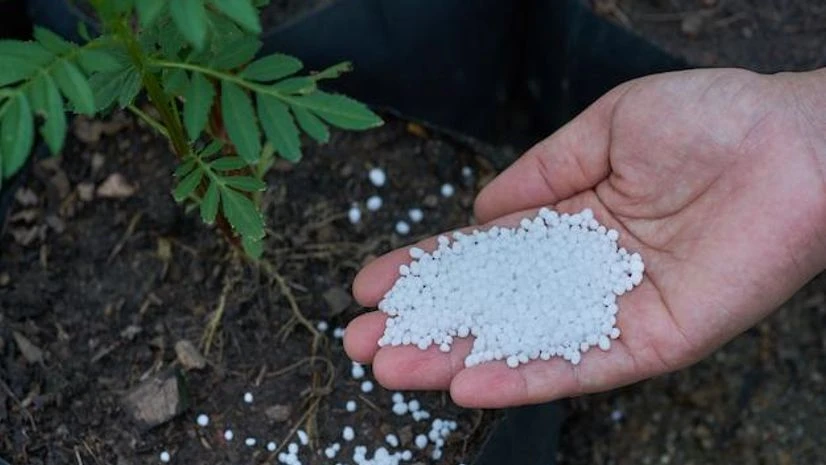India's conventional urea consumption is estimated to decline 25 lakh tonnes this fiscal on increase in demand of nano liquid urea and the government's efforts to discourage use of chemical fertilisers, Union Minister Mansukh Mandaviya said on Friday.
Chemicals and Fertilisers Minister Mansukh Mandaviya also highlighted that the Cabinet on Thursday approved a Rs 24,420 crore subsidy on Phosphatic and Potassic (P&K) fertilisers for the kharif season.
The prices of all fertilisers, including urea and Di-ammonium phosphate (DAP), will not increase, he said.
"The Modi government has made a lot of efforts to promote alternate fertilisers and discourage use of chemical fertilisers. The use of nano liquid urea is also gaining momentum," Mandaviya said.
As a result, the minister said, "The consumption of urea in 2023-24 is estimated to decline by 25 lakh tonnes."
Mandaviya said the urea consumption stood at 357 lakh tonnes during FY23.
"During April-January period of this fiscal, the total urea consumption stood at 317 lakh tonnes," he said, adding that the figure would reach around 330 lakh tonnes for the entire fiscal.
More From This Section
The minister attributed the likely fall in conventional urea consumption to increased demand of nano liquid urea. He said a total of 7 crore nano urea bottles have been sold during the August 2021 and February 2024 period.
Mandaviya noted that consumption of conventional urea has gone down in 344 districts, while the use of nano liquid urea has gone up in 74 districts.
India's urea production capacity is at 320 lakh tonnes annually and will reach 332.5 lakh tonnes after the revival of closed plant at Talchar in Odisha.
He asserted that the country will be 100 per cent self-sufficient in urea by 2025.
Cooperative organisation IFFCO had launched nano liquid urea a few years back. It has also provided technology to some other companies to set up nano urea plant.
Mandaviya also noted that the government's 'PM Programme for Restoration, Awareness, Nourishment and Amelioration of Mother Earth' (PM-PRANAM) scheme is also one of the factors for reduction in demand for chemical fertilisers.
The scheme incentivises states and Union Territories (UTs) to promote the usage of alternative fertilisers and balanced use of chemical fertilisers.
"Gujarat, Uttar Pradesh, Madhya Pradesh, and Haryana have come forward in a big way to implement this scheme," the minister said.
To reduce import dependence on potash, Mandaviya also highlighted that India will be able to manufacture 5 lakh tonnes of potash annually from molasses, a byproduct of sugarcane.
At present, he said 40 lakh tonnes of potash is being imported annually.
On Thursday, the Union Cabinet approved the proposal of the Department of Fertilisers for fixing the Nutrient-Based Subsidy (NBS) rates for the kharif season 2024-25 (April 1 to September 30) on P&K fertilisers.
A nutrient-based subsidy of Rs 24,420 crore on P&K fertilisers has been approved for the kharif season starting April 1 to September 30.
The subsidy on nitrogen has been fixed at Rs 47.02 per kg, phosphatic at Rs 28.72 per kg, potassic at Rs 2.38 per kg, and sulphur at Rs 1.89 per kg for the 2024 kharif season.
With this subsidy, DAP which is sold currently at Rs 1,350 per bag (50 kg), will continue to be available at the same rate in the upcoming 2024 kharif season.
Muriate of Potash (MoP) will also continue to be available at Rs 1,670 per bag, while NPK will be available at Rs 1,470 per bag.
In order to reduce the import dependence on DAP, the Cabinet also approved the inclusion of three new fertiliser grades under the NBS scheme.
Inclusion of three new grades in NBS will support in promoting balanced soil health and offer alternatives to the framers to choose fertilisers fortified with micro-nutrients as per the soil requirement, the minister said.
As per the official data, the government has provided nearly Rs 1.71 lakh crore as fertilisers subsidy till January in this fiscal year.
For 2024-25, the government has allocated fertiliser subsidy of Rs 1.64 lakh crore as against the revised estimates of Rs 1.89 lakh crore for the ongoing fiscal.
(Only the headline and picture of this report may have been reworked by the Business Standard staff; the rest of the content is auto-generated from a syndicated feed.)

)
